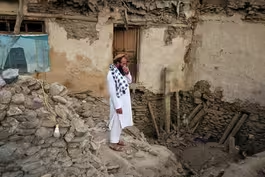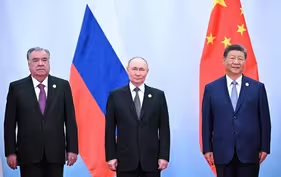
Tamara Keith and Amy Walter on Trump's Chicago threats
Clip: 9/1/2025 | 8m 50sVideo has Closed Captions
Tamara Keith and Amy Walter on Trump's threats of a Chicago takeover
NPR’s Tamara Keith and Amy Walter of the Cook Political Report with Amy Walter join Geoff Bennett to discuss the latest political news, including President Trump's threats of a federal takeover of Chicago, Democrats' chances of taking the Senate with more seats in play and Trump's connection with working-class voters.
Problems playing video? | Closed Captioning Feedback
Problems playing video? | Closed Captioning Feedback
Major corporate funding for the PBS News Hour is provided by BDO, BNSF, Consumer Cellular, American Cruise Lines, and Raymond James. Funding for the PBS NewsHour Weekend is provided by...

Tamara Keith and Amy Walter on Trump's Chicago threats
Clip: 9/1/2025 | 8m 50sVideo has Closed Captions
NPR’s Tamara Keith and Amy Walter of the Cook Political Report with Amy Walter join Geoff Bennett to discuss the latest political news, including President Trump's threats of a federal takeover of Chicago, Democrats' chances of taking the Senate with more seats in play and Trump's connection with working-class voters.
Problems playing video? | Closed Captioning Feedback
How to Watch PBS News Hour
PBS News Hour is available to stream on pbs.org and the free PBS App, available on iPhone, Apple TV, Android TV, Android smartphones, Amazon Fire TV, Amazon Fire Tablet, Roku, Samsung Smart TV, and Vizio.
Providing Support for PBS.org
Learn Moreabout PBS online sponsorshipGEOFF BENNETT: It's a federal holiday, but things are about to get very busy this week with what appears to be a looming federal takeover of Chicago and more political fights over congressional redistricting.
Joining us now for Politics Monday is Amy Walter of The Cook Political Report With Amy Walter and Tamara Keith of NPR.
Our thanks to you both for laboring on this Labor Day.
AMY WALTER, The Cook Political Report: You're welcome.
TAMARA KEITH, National Public Radio: Good to be here.
GEOFF BENNETT: All right, let's start with the story we mentioned first.
President Trump is again threatening to send troops into Chicago, with the Pentagon reportedly preparing a deployment from a nearby Navy base as soon as this week.
The governor, J.B. Pritzker, says that Trump is using the military to invade the state.
Tam, this appears to be a calibrated escalation of the limits of executive power.
What's the White House saying about it?
TAMARA KEITH: Well, the president has said that he can do anything, he's the president, and he was specifically talking about this.
But, in that same breath, he also said he wants to be invited.
He wants the governor to ask.
And the fact is that there are more limits on what he can do in a state where the governor has not invited the National Guard than, for instance, Washington, D.C., where the president has much more control.
What we know about the request so far is that it seems to be limited.
Now, that obviously could change, and President Trump has been known to say things and then change where he's headed.
But the Department of Homeland Security requested help from the National Guard for limited support in the form of facilities, infrastructure and other logistical needs to support Department of Homeland Security operations.
That's a lot of words to say they're not talking, at least in this request, about National Guard patrolling the streets in some sort of law enforcement capacity.
This would be much more limited, perhaps more similar to Los Angeles, where -- and that is still being litigated - - whether that was a proper use of the National Guard without the blessing of the governor or the mayor, but where National Guard troops were there in support of federal agents doing their thing, in that case, ICE.
GEOFF BENNETT: And, Amy, the story the president appears trying to -- that he's trying to tell is that these Democratic strongholds, whether it's L.A., New York, Chicago, Baltimore, that they are dangerous, they're lawless, their leaders are ineffective, and that he is the one that needs to come in and impose order.
Is that a message, a story that's resonating?
AMY WALTER: Well, we haven't seen a whole lot of polling on this, but the one poll that has come out recently from Quinnipiac last week showed that overwhelmingly majority of Americans do not like what they are seeing for what's happening in Washington, D.C., with the federal enforcement there and federal troops there.
Now, not surprisingly, Republicans very support in this poll, very, very supportive of it.
Democrats hate it, but it's independence that break probably about 60 percent -- I think the number was 61 percent against it.
And what that says to me is, this feels very familiar.
It feels like the first term too, where the president does things, takes actions that galvanize the base, that anger the opposition, but also really aren't appealing to the folks who are independent-leaning.
And that becomes a problem politically in the future, because if those voters don't believe that what the president's doing is actually helping them or dealing with the issues that they think are important, or if they think that he's doing something that they find that is out of bounds, those are the folks who could turn out and vote against Republicans next time around.
Or they're the ones who maybe voted for a Republican in the last election, but feel less excited or less interested in doing it now.
GEOFF BENNETT: Yes.
Well, let's shift our focus to the Senate map, because I have been waiting since last week to ask you about Senator Joni Ernst's decision not to seek reelection.
This all along had been thought to be a tough map for Democrats.
What does her decision not to seek reelection mean?
AMY WALTER: So it is a tough map.
Democrats would need to net four seats.
And to do that, they have got to hold on to two very vulnerable seats of their own in Georgia and Michigan.
The next -- if they do that, the most likely opportunities for them are two states that are blue and purple, Maine and North Carolina, held by Republicans.
Then they got to find two more.
And that's where it gets tricky, because the only states left on the board are deeply Republican, ones that Trump won by double digits.
Now, I think it's the lotto.
I can't remember who has the slogan of, if you don't play, you can't win.
GEOFF BENNETT: Yes, got to play to win.
AMY WALTER: And that's kind of - - yes, you got to play to win, which is kind of what Democrats are doing here.
Yes, it's an uphill fight to win in those states.
But right now, Iowa is on the map.
And there were -- there have been a number of special elections held in that state this year, including one last week for a state Senate seat where the Democrat has outperformed what a Democrat had gotten there two years earlier.
So Democrats feeling hopeful for what they see there.
And open seats are harder for the party that's defending it to hold on to, because a new person has to come in and introduce themselves.
And there could be a difficult primary.
So, Democrats are putting more seats in play most recently with Ohio -- before this was Ohio, where Senator Sherrod Brown said he's running to try to get his seat back, so still uphill, but there are now candidates and opportunities.
If the winds are blowing the right way next year, it could work.
GEOFF BENNETT: Well, on this Labor Day, we should mention that President Trump was elected on promises he would fight for workers.
Many labor advocates say, in fact, it's the opposite, that he's consistently put corporate interests ahead of labor.
And just last week, the president said he was not going to recognize the collective bargaining agreements with unions representing five agencies, to include NASA, the National Weather Service.
You see the others there on the screen.
Tam, how does the White House account for all of that?
TAMARA KEITH: President Trump has made little secret of his distaste for labor unions.
He feels that they are a tool of the left.
And the fact is that most labor unions have been aligned with Democrats for a very long time.
So the fact that they are going after unions, failing to recognize collective bargaining, that's not a surprise.
The way the White House portrays President Trump's policies is that they are pro-worker.
They describe the tariffs as pro-worker, an effort to onshore jobs, and really targeted at blue-collar workers, which are the very people where Republicans and President Trump have been able to make up some ground.
So whether Trump is pro-worker or not, I think, depends on whether it's the White House telling the story or whether it is Democrats and labor unions telling the story.
GEOFF BENNETT: And, Amy, what about the Democrats?
Because it was President Biden who bailed out the Teamsters' pensions, and yet the Teamsters still didn't endorse Kamala Harris.
And there are many union members who voted for Donald Trump based on cultural issues, and not because they thought Biden had the backs of labor.
AMY WALTER: Yes, there's been a disconnect for some time now between rank-and-file members and the leadership, leadership I think being much more Democratic-leaning than many of their members are.
At the same time, I think one of the reasons that the so-called blue wall of Pennsylvania, Michigan, and Wisconsin continues to be so competitive and where Democrats obviously won it in 2020, Biden did, Kamala Harris narrowly losing those states, is that they still do have a pretty heavy labor influence.
And while Harris did not do as well there as, say, Joe Biden did, she still won labor union -- people who say they are part of a labor union.
So we know we have a great reshuffling in this country of our political coalitions.
Democrats were long seen as the party of the working class.
It is now Republicans who are winning over many more of those types of voters.
But labor unions, in and of themselves, don't necessarily represent just all -- they don't represent all working-class folks.
And their influence continues to wane as fewer and fewer people are part of a union.
I think now it's less than 10 percent of Americans are a member of a union.
GEOFF BENNETT: Amy Walter and Tamara Keith, thanks so much.
We appreciate it.
AMY WALTER: You're welcome.
TAMARA KEITH: You're welcome.
50 years after 'Jaws,' researcher dispels myths about sharks
Video has Closed Captions
Clip: 9/1/2025 | 6m 42s | 50 years after 'Jaws,' researcher dispels myths about sharks (6m 42s)
Court blocks deportation flights of unaccompanied minors
Video has Closed Captions
Clip: 9/1/2025 | 6m 31s | Court blocks deportation flights of unaccompanied minors to Guatemala (6m 31s)
David Duchovny on poetry influenced by his life and career
Video has Closed Captions
Clip: 9/1/2025 | 6m 56s | David Duchovny on his new book of poetry influenced by his life and career (6m 56s)
Devastating earthquake strikes Afghanistan, deepening crisis
Video has Closed Captions
Clip: 9/1/2025 | 3m 59s | Devastating earthquake strikes Afghanistan, deepening humanitarian crisis (3m 59s)
Medical advancements could reshape outlook for Trisomy 18
Video has Closed Captions
Clip: 9/1/2025 | 8m 20s | How medical advancements could reshape the outlook for children with Trisomy 18 (8m 20s)
News Wrap: China welcomes allies to annual security summit
Video has Closed Captions
Clip: 9/1/2025 | 6m 16s | News Wrap: China welcomes closest allies to annual security summit (6m 16s)
Photojournalist documents arrests at immigration hearings
Video has Closed Captions
Clip: 9/1/2025 | 4m 45s | Photojournalist documents arrests outside of immigration hearings (4m 45s)
Providing Support for PBS.org
Learn Moreabout PBS online sponsorshipSupport for PBS provided by:
Major corporate funding for the PBS News Hour is provided by BDO, BNSF, Consumer Cellular, American Cruise Lines, and Raymond James. Funding for the PBS NewsHour Weekend is provided by...


















